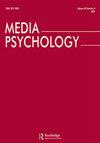受媒体内容启发:产生灵感的心理过程
IF 2.6
2区 心理学
Q1 COMMUNICATION
引用次数: 3
摘要
摘要本研究提出了一个由媒体内容引发的三个过程——唤起、超越和动机——的模型,试图定义什么样的媒体内容可以导致灵感状态。具体来说,在唤起过程中,媒体内容在更大程度上打动了人们,进而激发了他们的思想;在超越过程中,它产生了更多的希望感,进而引发了更大的自我膨胀感;在激励过程中,媒体内容会产生更多的活力感,进而在更大程度上激励人们模仿角色。这三条多阶段路线都可能带来更大的灵感。两项试点研究确定了三个激励人们的共同内容主题,即它们展示了人们的道德美德、转变(即在逆境中通过毅力克服困难)和创造力。研究1中的实验使用新闻节目中的故事来测试所提出的过程模型,这些故事通过例子展示了道德美德、转变和创造力。研究2中的第二个实验通过比较不同创造力水平的竞赛节目(烹饪、唱歌、测验)提供了进一步的测试。涉及更多创造力的媒体内容通过这三个过程在更大程度上激励观众。本文章由计算机程序翻译,如有差异,请以英文原文为准。
Being Inspired by Media Content: Psychological Processes Leading to Inspiration
ABSTRACT In proposing a model of three processes triggered by media content – evocation, transcendence, and motivation – this study seeks to define what kinds of media content can lead to a state of inspiration. Specifically, during the evocation process, media content moves people and then provokes their thoughts to a greater extent; in the transcendence process, it generates more hopeful feelings and then elicits a greater sense of self-expansion; and in the motivation process, media content generates more feelings of vitality and then motivates people to act like the characters (i.e., emulate them) to a greater degree. All three multi-stage routes might lead to greater inspiration. Two pilot studies identify three common content themes that inspire people, such that they demonstrate people’s moral virtues, transformation (i.e., overcoming difficulties through perseverance despite adversity), and creativity. The experiment in Study 1 tests the proposed process model using feature stories in news programs that demonstrate moral virtues, transformation, and creativity by exemplars. A second experiment in Study 2 provides a further test by comparing competition shows that involve different levels of creativity (cooking, singing, quizzes). Media content involving more creativity inspires viewers to a greater degree, through all three processes.
求助全文
通过发布文献求助,成功后即可免费获取论文全文。
去求助
来源期刊

Media Psychology
Multiple-
CiteScore
8.60
自引率
7.10%
发文量
30
期刊介绍:
Media Psychology is an interdisciplinary journal devoted to publishing theoretically-oriented empirical research that is at the intersection of psychology and media communication. These topics include media uses, processes, and effects. Such research is already well represented in mainstream journals in psychology and communication, but its publication is dispersed across many sources. Therefore, scholars working on common issues and problems in various disciplines often cannot fully utilize the contributions of kindred spirits in cognate disciplines.
 求助内容:
求助内容: 应助结果提醒方式:
应助结果提醒方式:


